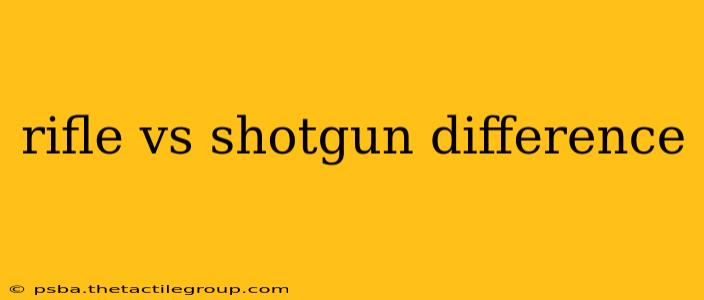Choosing between a rifle and a shotgun depends heavily on your intended use. While both are firearms designed for hunting or self-defense, their mechanisms, ammunition, and effective ranges differ significantly. This article will delve into the core distinctions between rifles and shotguns, helping you understand which firearm best suits your needs.
Ammunition: The Fundamental Difference
Perhaps the most crucial difference lies in their ammunition. Rifles fire single projectiles, typically bullets, propelled down a rifled barrel. This rifling—the spiral grooves inside the barrel—imparts spin to the bullet, increasing accuracy and range. Bullet calibers vary widely, from small .22LR rounds to powerful magnum cartridges.
Shotguns, on the other hand, fire numerous small projectiles called shot, pellets, or slugs. These projectiles are contained within a shotshell cartridge. While shotguns can fire slugs (single projectiles similar to rifle bullets), their primary purpose is typically dispersion of shot over a wider area. This makes them effective at close to medium ranges.
Barrel Design and Accuracy
The design of the barrel directly impacts the firearm's accuracy and range. Rifle barrels are long, and their rifling imparts a stable trajectory to the bullet, allowing for precise shots at extended distances. This makes rifles ideal for hunting larger game at longer ranges.
Shotgun barrels are generally shorter and smoother (though some specialized shotguns feature rifled barrels for slugs). The smooth bore facilitates the dispersion of shot, making it effective for close-range hunting or self-defense scenarios where multiple pellets striking the target are more crucial than pinpoint accuracy at long distance.
Effective Range
Rifles have a considerably longer effective range than shotguns. The precise trajectory of rifle bullets allows for accurate shots at hundreds of yards, depending on the caliber and the shooter's skill.
Shotguns are most effective at much shorter ranges. The spread of shot becomes increasingly wide with distance, reducing its effectiveness beyond around 50 yards. While slugs can extend the range somewhat, they lose their advantage over rifles at longer distances.
Applications and Use Cases
The choice between a rifle and a shotgun depends on your specific application:
Rifles are typically preferred for:
- Long-range hunting: Their accuracy and range make them ideal for taking down game animals at significant distances.
- Target shooting: The precision of rifles makes them perfect for competitive shooting sports.
- Self-defense (in some contexts): While not as common as shotguns for home defense, rifles can be effective in certain situations where longer ranges are involved.
Shotguns are often chosen for:
- Home defense: The wide spread of shot offers a wider margin for error in close-quarters situations, increasing the likelihood of hitting the target.
- Close-range hunting: Their effectiveness in dispersing shot makes them suitable for hunting smaller game at closer ranges.
- Bird hunting: Shotguns are specifically designed for bird hunting, as the pattern of shot is ideal for bringing down flying targets.
Conclusion: The Right Tool for the Job
Ultimately, the best choice between a rifle and a shotgun depends on your specific needs and intended use. Consider the range, accuracy, and the type of target you will be engaging with when making your decision. Both firearms are valuable tools with different strengths and weaknesses. Understanding these differences is crucial for choosing the right firearm for your situation.

